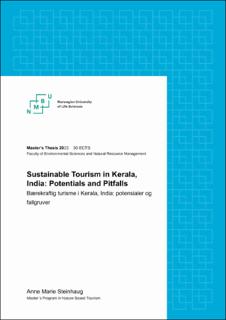| dc.description.abstract | Tourism is vital to the global economy, especially in developing countries, but the sector faces obstacles in reaching the UN´s 17 sustainability goals. Developing countries, such as India, are dependent on tourism as a foreign exchange earner, and despite the industry´s potential to bring benefits in environmental protection and sociocultural conservation, other alternatives for earning foreign currency are limited. Kerala, located on the Malabar Coast in southwest India, is marketed as “God´s own country” and is known for its eco-tourism, backwaters, and unique culture. The state announced “industry status” for tourism in 1986, becoming one of the earliest states in India to recognize its potential. Kerala also developed a Responsible Tourism Mission framework to prioritize economic, social, and environmental responsibility.
Thus, this master´s thesis has investigated the challenges concerning sustainable development within the backwater tourism business operators in the Alappuzha district in Kerala. To answer the research questions for this thesis, it was essential to get an understanding of the already existing sustainable practices implemented within the backwater tourism in Alappuzha. The methods used for this research were qualitative semi-structured interviews within three business types: houseboats-, resorts-, and homestays.
The main findings from this research are that sustainability means a lot of different things to the businesses. Besides mentioning some challenges related to environmental and economic sustainability, terms such as resilience and survival, are mentioned. It also seems that there are different understandings between the business categories and that larger and probably more professional businesses more often align with established definitions and goals. Houseboats are less familiar with sustainability, while resorts tie it to operational survival and being nature-friendly. Homestays vary in their familiarity but prioritize sociocultural sustainability and business stability. As for the sustainability challenges, they all mentioned infrastructure as the biggest challenge.
Regarding certification, there is much focus on government approval (certification), especially on pollution. However, other private or public-private certification systems are known and partly used by some businesses. Nevertheless, there is little interest in more/new/eco-certifications, which may be due to the intense focus on government approval. However, interview challenges related to language barriers might have led to misunderstanding and a lack of follow-up questions on this part.
Keywords: Sustainable Tourism, India, Backwater Tourism, Responsible Tourism, Kerala, Alappuzha | |
